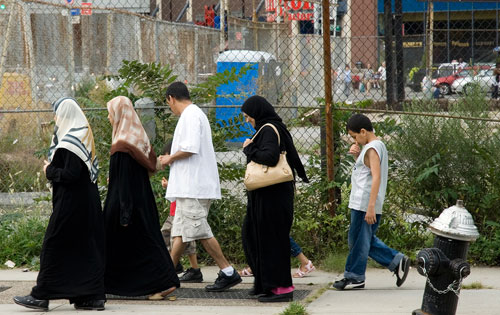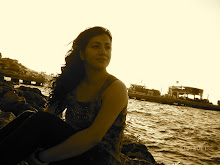Gotham Gazette - http://www.gothamgazette.com/article/civilrights/20100104/3/3139
City's Muslims Report Harassment by Policeby Farah Akbar
04 Jan 2010
Coming from a family with members who work in law enforcement, Yasmin Nasser used to look at police officers as honest, upstanding and there to protect all members of society. Today, though, Nasser said, she feels uneasy when she walks by cops and, for a brief period, tried staying away from them altogether.
The 20-year-old American citizen who resides in Saudi Arabia had come to New York City to visit family. Her trust in New York City's finest eroded the day she claims a police officer pulled her by the arm, told her to leave Rockefeller Center, where she had gone to see the Christmas tree, and called her a "terrorist." She was asked to provide identification to the officer, was subsequently accused of having phony identification and allegedly told, "Leave you terrorist, you shouldn't be here."
"It's so hard for me to believe that a cop could do this," said the Muslim woman who covers her head with the traditional headscarf (hijab) worn by some women who follow the Islamic faith. "I couldn’t get over it. I was in shock," she said.
Nasser has reported the matter to the Council of American Islamic Relations and plans on filing a report with the city Civilian Complaint Review Boardonce she returns to Saudi Arabia. She fears that making a complaint prior to her departure could disrupt her travel plans.
Advocates say that Nasser's story is not an isolated incident. Monami Maulik, executive director of Desis Rising Up And Moving (DRUM), an immigrants' rights organization in Jackson Heights, said that she has heard many similar stories. Several other organizations say police harassment of Muslims is a genuine problem.
Encounters with Police
The Council of American Islamic Relations analyzed civil rights cases in 2008 by circumstances of occurrence. The group found encounters with police ranked sixth, following schools and prison. "Underreporting of hate crimes and police misconduct cases remains a real issue with American Muslims," said the council's New York civil rights director Aliya Latif.Since the Sept. 11, 2001 attacks, law enforcement officials have worked on building a cooperative relationship with the American Muslim community in an effort to obtain valuable information related to terrorism and safety issues. Muslim groups worry that allegations of misconduct by law enforcement damage the fragile ties between the two groups. "We are concerned that incidents like these further alienate community members and contribute to an atmosphere of mistrust with law enforcement authorities," Latif said.
Edina Lekovic, communications director for the Muslim Public Affairs Council, agrees. "The evidence of any problem with law enforcement undermines any cooperation they may seek from Muslims," she said. "Even if there is a perception of harassment, it very naturally leads individuals to be cautious and reluctant to seek help from law enforcement, let alone report any suspicious activity."
A police officer, though, may see the situation differently. "Police officers may not always realize how they have come across to a civilian," said Graham Daw, a spokesperson for the Civilian Complaint Review Board, the all-civilian board that investigates civil complaints about alleged misconduct on the part of the New York City Police Department. "Civilians are not always aware of the pressures under which police officers work or the powers with which they are vested in order to do their job."
The New York City Police Department was contacted numerous times to comment on this issue but did not respond.
According to DRUM, many Muslims have complained about being randomly approached by members of law enforcement in their own neighborhoods and apartment buildings and being asked about their whereabouts and about what they did for a living.
Maulik said that her organization has received hundreds of accounts of cases regarding police misconduct since Sept. 11, many from blue-collar workers such as street vendors and taxi drivers. She also hears stories from youth.
Slurs and Questions
In 2006, DRUM and the Urban Justice Center Community Development Project surveyed 662 South Asian youths living in Queens, most of them Bangladeshi and Pakistani Muslims, about the impact of school safety policies on them. The report revealed that nearly a third of the youths reported having seen harassment by police officers or experienced harassment. The study defined harassment to include "verbal abuse or harassment such as racial slurs and names, yelling and cursing; physical abuse or harassment, including physical harm, grabbing, pushing, forcing to do something the person does not want to do; and intimidation, including asking for identification or calling over for no reason, threatening to report person or their family to immigration and bullying.""Since 9/11, there are a lot more security agents and police," said one young person. "They treat us differently."
"There is more hatred against South Asians [post 9/11]. The police pay more attention to you; they think you are suspicious. They wait for you to screw up," said another.
DRUM received a report on one incident in which a teenage girl who wore a hijab on the streets of Times Square was allegedly asked by a police officer if she was a terrorist.
Ayesha Mahmooda, who works with DRUM, spoke to at least 100 South Asian families in Flushing during an outreach effort and found many reported experiencing harassment by law enforcement. She said that many South Asians described feeling scared while being questioned by officers. She mentioned the case of a Muslim man who was questioned by law enforcement officials inside his own apartment. They asked him numerous personal questions, such as where he was born, what his immigration status was and if he smelled anything funny in his building, an apparent reference to possible bomb-making activities.
An alarmed South Asian woman asking Mahmooda why her husband was stopped and questioned by law enforcement on his way home from working the late shift. "I told her that it was because of the color of his skin, he is not white. He is a person of color," Mahmooda said.
A Reluctance to Protest
Those questioned are often afraid to protest, according to DRUM. Latif of CAIR, though, urges Muslims to exercise their right to have a lawyer present if questioned by the FBI or police. "Refusing to answer questions without an attorney present cannot be held against you and does not imply that you have something to hide," she said.Few Muslims take their cases to the Civilian Complaint Review Board. Of the 14 allegations of offensive language based on religion reported to the board in 2008, only two involved Muslims or Islam, and the board was unable to conduct a full investigation in either case. One complaint was withdrawn by the complainant, and the complainant in the other case did not respond to requests to be interviewed by board.
"100 percent of the cases that we've ever gotten, no one has ever called the CCRB," says Maulik. "We really don't have faith in the CCRB. It is not a mechanism that has worked for many years in New York, so for the most part, Muslim immigrants don't call the CCRB and file complaints.
People do not think the board will hold police accountable for harassment or profiling, she said adding that Muslims who are undocumented immigrants are particularly hesitant to report any instances of misconduct to the complaint board. Instead, she said, they live their lives in fear.
Daw said the board would be glad to make a presentation to the Muslim community to educate them about its work, but Monami has no plans of reaching out to them. She has been working on a project to create a formal complaint process with CUNY School of Law.
Lekovic of the Muslim Public Affairs Council encourages Muslims to report all instances of misconduct to whomever they feel comfortable with, whether it be to Muslim organizations or city agencies . "Without individuals sharing their experiences, we do not have leverage to make change," she said.
Meanwhile, Yasmin Nasser thinks about what happened to her on her most recent visit to New York. "People in Saudi Arabia ask if people discriminate in New York City, and I always say 'people are nice,'" said Yasmin Nasser. When she lands in Saudi Arabia this time, though, she may offer a different answer.
Gotham Gazette - http://www.gothamgazette.com/article/civilrights/20100104/3/3139

